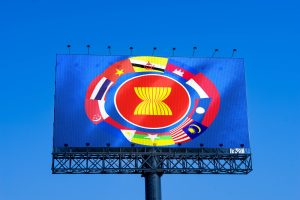As China’s economic relationship with ASEAN continues to deepen, the region must proactively manage the risks of overreliance alongside the benefits of increased trade and investment. China’s economic importance to ASEAN is undeniable. It is ASEAN’s largest trading partner, accounting for nearly 20 percent of total trade, and it contributed a third of the region’s foreign direct investment into the manufacturing sector last year.
A recent survey by the ISEAS-Yusof Ishak Institute revealed a stark dichotomy: While nearly 60 percent of Southeast Asian experts view China as the dominant economic force in the region, a significant majority worry about its expanding influence. Over a third fear China could use economic tools punitively. These concerns are not unfounded, as China has previously restricted imports from the Philippines and Vietnam during territorial disputes.
Lithuania’s ordeal highlights that even nations with limited economic reliance on China are vulnerable to its coercive tactics. The Baltic state faced an effective trade embargo from Beijing after allowing Taiwan to open a representative office in Vilnius, seen by China as violating its One China principle. China blocked almost all imports from Lithuania and pressured European firms to stop using Lithuanian components.
The situation echoed the experience of a larger economy, Australia, when it faced Chinese trade restrictions for supporting an investigation into COVID-19’s origins. Australia’s economic resilience and domestic political consensus allowed it to weather this challenge before China ultimately lifted most of the measures.
Similarly, while the crisis in Lithuania initially revealed gaps in communication and coordination, Vilnius quickly recalibrated by setting up a dedicated hotline, providing financial support for affected Lithuanian companies, and working with industry to find alternative markets and adjust supply chains.
Despite the economic pressure, Lithuania remained firm, rallying the EU to launch a WTO case against China and receiving diplomatic and economic support from the United States. Taiwan also initiated joint projects and investments with Lithuania. Vilnius used the crisis to accelerate trade diversification, particularly in the Indo-Pacific. As Foreign Minister Gabrielius Landsbergis warned, “If you’re dependent, know that it can become a weapon and most likely it will be a weapon one day.”
The Lithuania case, detailed in a recent Asia Society Policy Institute report, offers valuable lessons for Southeast Asia. First, overreliance on economic ties with China can too easily give Beijing a geopolitical lever. Countries should assess vulnerabilities in industries reliant on China, identifying sensitive sectors or other potential pressure points. Taking precautionary steps to diversify and plan for contingencies can not only better prepare countries to respond to coercion but can also serve as a deterrent from China attempting to weaponize trade in the first place.
Second, having a strategic game plan is crucial. Countries would benefit from setting up inter-agency committees to anticipate and respond to economic pressures, ensuring strong coordination across various sectors and levels of government. Effective communication with the business community and the development of robust crisis management playbooks are essential. Strengthening relationships within ASEAN and with key dialogue partners should also be a priority.
Third, ASEAN should strengthen internal bonds and push forward diversification plans within and outside the region. By bolstering ASEAN’s existing initiatives to deepen intra-regional supply chains, Southeast Asia can reduce its vulnerability to economic coercion and enhance its position as a global trading bloc. As part of this effort, ASEAN could initiate a regional dialogue to share experiences, best practices, and strategies for mitigating economic risks, laying the groundwork for more coordinated action. Engagement with key Asian partners such as Japan, South Korea, and India would further diversify the region’s economic portfolio.
Recent developments present opportunities for ASEAN to strengthen its position. The election of a new president in Indonesia, the region’s largest economy, could be a chance to bolster ASEAN unity and collectively address the challenges posed by economic overdependence on China.
At the same time, the Philippines is deepening economic ties with the United States and Japan, underscoring the availability of alternatives to diversify economic relationships. As the Philippine ambassador to the U.S., Jose Manuel Romualdez, stated, “These are things being used by [China] for economic coercion – that’s always on the table. That’s why we are working double time to look at other markets.”
To be sure, there are significant differences between Lithuania’s situation and that of Southeast Asian countries. The region’s extensive economic ties with China, deeply interconnected supply chains, and the difficulty of developing alternative markets make diversification far more challenging. ASEAN’s diverse membership and the risk of measures being perceived as anti-China complicate achieving a consensus. As a result, efforts to enhance coordination and assess vulnerabilities would likely need to start at the national level.
Yet Southeast Asian nations can’t afford to be complacent about the risks of economic coercion as their ties with China deepen. Renewed U.S. economic engagement has a critical role to play. Commerce Secretary Gina Raimondo’s visit to the Philippines in March, announcing over $1 billion in investments, is a positive step. Initiatives like the Indo-Pacific Economic Framework’s Supply Chain Agreement could serve as a platform for collaboration on collective responses to economic coercion. Washington should promote economic partnerships that counter China’s assertiveness with constructive alternatives and sustained investment.
Lithuania’s experience provides a wake-up call for Southeast Asia about the risks of economic coercion. Learning from Lithuania, countries in the region have a blueprint to get ahead of the challenge. Proactive planning and strategic diversification can transform vulnerabilities into strengths, positioning ASEAN for a more resilient economic future.

































